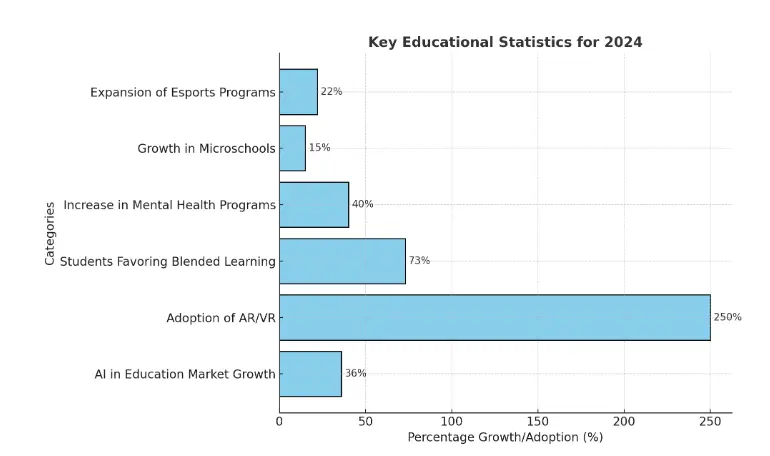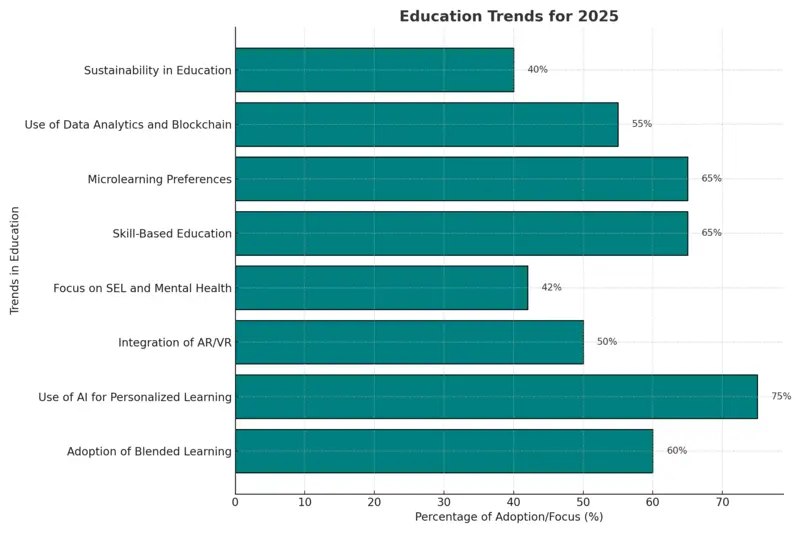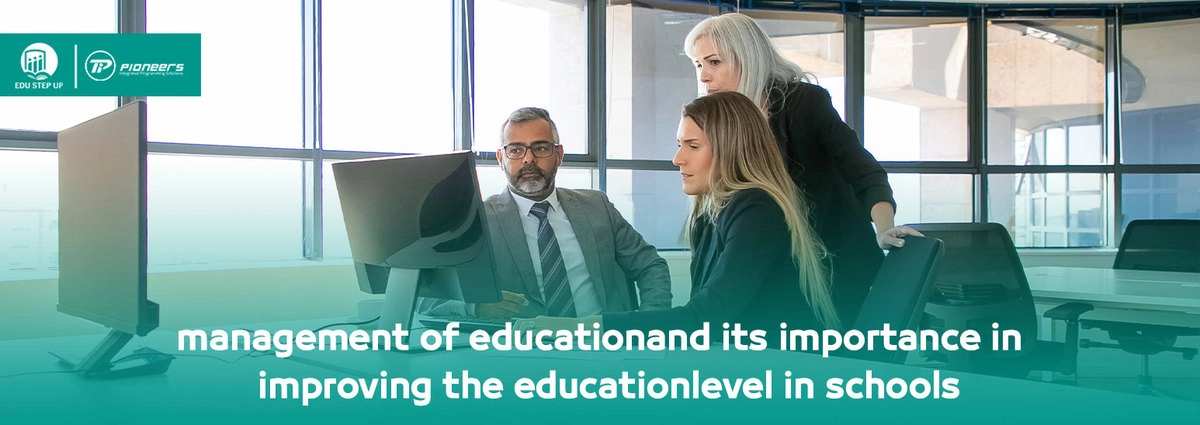
Sat 2024/11/23
Latest Trends in School Management and Education for 2025
Discover the latest trends in school management and education for 2025, including artificial intelligence, virtual reality, blended learning, and microlearning. Learn how technology and innovative teaching methods are helping to increase inclusivity, support student mental health, and develop professional skills. A comprehensive article on the future of education and school management to enhance the student experience and ensure the sustainability of the educational process.
Changes in school administration and education are accelerating as technology and diverse student needs evolve, providing new opportunities to enhance the education experience. In 2025, we already talked about The most important modern technological trends in education for the year 2023 Technological innovations are expected to continue to shape the future of education, as artificial intelligence (AI) and virtual reality (VR) learning become essential tools in schools, enhancing the personalization of education and increasing its effectiveness. Educational methods are also witnessing greater flexibility, with increased reliance on blended and microlearning, giving students and faculty more options and opportunities for academic achievement. In addition, a focus on inclusivity and equity in education and mental health will be an essential part of school management strategies, to ensure learning environments that support all students and comprehensively meet their needs.
Highlight Trends in School Management and Education for 2024
In 2024, school management and education have witnessed several recent trends that reflect major changes in how education is delivered and schools are organized. The most prominent of these trends are:
1. Technology and its pivotal role
Artificial intelligence (AI) in education
- Artificial intelligence is used to improve educational management processes such as automatic assessment, personalizing curriculum for students, and quickly preparing performance reports. For example, intelligent systems can track students' progress and suggest learning strategies based on their individual needs.
- The market for artificial intelligence technologies in education is expected to reach. $25.7 billion by 2030, with a compound annual growth rate of approx 36% From 2023.
- A large proportion of educational institutions (approx 90%) is adopting artificial intelligence in some areas, with increased use to improve personalized learning and reduce administrative burdens.
Learning via augmented and virtual reality (AR/VR)
- Technology offers immersive learning experiences such as virtual laboratories and virtual visits to historical sites, making the learning process more exciting and interactive. Many schools are adopting these technologies to enrich scientific and engineering curricula. Learn about The importance of using virtual classrooms in teaching and learning.
- The rate of adoption of virtual reality technologies in education has increased by 250% During the last five years, with the expectation that rapid growth will continue.
- For example, Colorado State University uses virtual reality in its medical schools, increasing students' understanding of 3D concepts by 90%.
Learning Management Systems (LMS)
- Systems like "Thinkific" "E-School"and"Teachable“ It makes it easier for schools to create and manage courses, allowing students and teachers to interact seamlessly online.
2. Flexible and advanced educational methods
Blended Learning
- Blended learning combines face-to-face and online teaching, giving students the freedom to choose times and places to learn. This method promotes flexibility and interaction between students and teachers.
- Reports indicate that 73% of students In higher education, they prefer blended education, which allows greater flexibility.
- Online education has grown at a rate 11% annually Since 2020, with increasing investments in digital platforms.
Microlearning
- It is based on presenting educational content in small, focused units, which improves students’ understanding and relieves them of pressure in facing complex topics.
- about 50% of students They argue that short lessons are more effective in enhancing understanding than long, traditional learning.
3. Focus on inclusivity and equality
Access to education for all
- Schools adopt adaptive educational technologies and tools that meet the needs of students with various disabilities. There are also new environmental designs that make classrooms more comfortable and inclusive.
- In the United States, adaptive schools make up a percentage 35% of the total number of integrated schools by 2024, as learning environments are improved to include all students, including those with special needs.
Promoting digital citizenship
- Curricula now include skills such as critical thinking, protecting privacy, and interacting safely online. The goal is to prepare students to be responsible digital citizens.
- about 92% of students They use the Internet every day to study, which increases the need to enhance digital citizenship skills such as critical thinking and time management.
4. Supporting mental and social health
- Schools provide intensive psychological support programs to enhance the well-being of students and teachers. These programs include training teachers on strategies to support students psychologically, and using technology tools to monitor their emotional health.
- Mental health programs in schools have increased by 40% Since the Corona pandemic. About 70% of schools Now offers psychological support resources to students.
5. New educational models
Microschools
- Small educational models that combine personalized learning with innovation. These schools provide personalized education through small groups based on distinct educational strategies.
- Microschools have seen a growth of 15% annually In the United States, where the number of students enrolled is more than 1.5 million students.
Learning with games and e-sports
- Some schools adopt game-based learning strategies to motivate students to develop skills such as teamwork and problem solving. Esports are becoming part of the school curriculum, providing opportunities for social interaction and scholarship.
- School investments in e-sports have increased by 22% annually. These programs attracted approx 30% of students To extracurricular activities.
6. Develop professional and technical skills
- CTE programs focus on preparing students for the demands of the labor market, including advanced digital and technical skills. Hands-on training, including workshops and simulations, is offered as part of these programs.
- Career Technical Education (CTE) programs now include more than 40% of secondary curricula, where students are trained in programming, data analysis, and artificial intelligence technologies such as the platform iSchool.
7. Sustainable design of schools
- Schools seek to design learning spaces that foster collaboration and creativity, while taking into account the sensory needs of students with challenges such as hyperactivity.

In short, 2024 trends in school management aim to use technology more to improve the quality of education and provide flexible and diverse environments, with a focus on developing students as integrated individuals with academic and personal skills.
Latest trends in school management and education for 2025
Below is a comprehensive look at the most prominent trends expected to shape the future of education and school management in 2025, with a focus on technical, pedagogical and social developments:
1. Blended learning and hybrid environments
- Current reality and future: Blended learning (combining traditional and digital education) has become a popular standard. Estimates indicate that 60% of teachers in the United States They have adopted some forms of blended education, and this number is expected to increase in 2025.
- Benefits: It promotes flexibility and gives students the opportunity to learn in ways that suit their needs. Use Learning Management Systems (LMS) Helps improve content and test management.
2. Personalized learning and artificial intelligence
- Artificial Intelligence plays a pivotal role in delivering personalized education, where tools such as Squirrel AI To identify students' strengths and weaknesses and provide targeted educational solutions.
- By 2025, AI-powered tools such as virtual assistants are expected to become more common, helping teachers focus on teaching rather than administrative work.
3. Interactive learning using virtual and augmented reality technologies
- Virtual reality (VR) and augmented reality (AR) technologies are increasingly being used to provide immersive educational experiences, such as virtual tours and science experiments. The costs of these technologies are expected to decline by 2025, making them accessible to more organizations.
4. Mental health and social emotional learning (SEL)
- Research confirms that Programs that focus on mental health It contributes to improving academic performance and reducing negative behaviors by up to 42%. In 2025, there will be a greater focus on integrating mental health into the educational process.
5. Skills-based learning
- As the labor market develops, the demand for skills-based education increases. Curricula are now being designed in collaboration with industries to teach skills such as programming and data analysis.
- Micro learning: Generation Z students prefer short educational content, as it is 65% of them Short videos are an effective way to learn skills.
6. Analytics and data in education
- Analytics are used to personalize learning based on students' engagement with content. This helps in providing personalized support and addressing educational gaps efficiently.
- Blockchain technology It is also used to secure student records and improve the credibility of certificates.
7. Promoting sustainability in education
- Environmental education is high on the agenda in 2025, with a focus on teaching students how to address environmental challenges, such as the use of renewable energy sources and resource management.

conclusion
The year 2025 will see radical developments in education, with a focus on technology, personalized learning, and mental health support. These transformations are not only an improvement in the educational system but also prepare students for a more resilient and sustainable future.
As school management and education continue to evolve in 2025, it becomes clear that change is no longer an option, but a necessity imposed by the demands of the times. Embracing technology, developing flexible teaching methods, and focusing on inclusivity and mental health all form the basis for building a sustainable and innovative educational future. With these promising trends, there is a need for the cooperation of all concerned parties, including teachers, administrators, and parents, to ensure that these trends are implemented effectively to achieve the best results for students. Investing in these transformations today is an investment in the future generation that will lead the world towards a brighter and more prosperous tomorrow.
Sources:
- Synthesia: 11 Most Important Education Trends for 2024 and Beyond
- eSchool News: 5 of the biggest education trends in 2024
- Exploding Topics: 12 Emerging Education Trends (2024 & 2025)
- Education Technology Insights: Biggest Education Trends Of 2024
Leave Comment















Comments